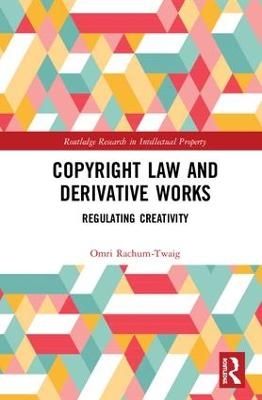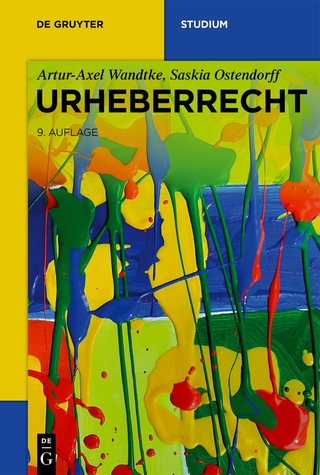
Copyright Law and Derivative Works
Routledge (Verlag)
978-1-138-34327-6 (ISBN)
Copyright law regulates creativity. It affects the way people create works of authorship ex-ante and affects the status of works of authorship significantly ex-post. But does copyright law really understand creativity? Should legal theories alone inform our regulation of the creative process?
This book views copyright law as a law of creativity. It asks whether copyright law understands authorship as other creativity studies fields do. It considers whether copyright law should incorporate non-legal theories, and if so, how it should be adjusted in their light. For this purpose, the book focuses on one of the many rights that copyright law regulates – the right to make a derivative work. A work is considered derivative when it is based on one or more preexisting works. Today, the owner of a work of authorship has the exclusive right to make derivative works based on her original work or to allow others to do so. The book suggests a new way to think about both the right, the tension, and copyright law at large. It proposes relying on non-legal fields like cognitive psychology and genre theories, and offers new legal-theoretical justifications for the right to make derivative works.
As the first book to consider the intersection between copyright law, creativity and derivative works, this will be a valuable resource for students, scholars, and practitioners interested in intellectual property and copyright law.
Omri Rachum-Twaig is adjunct professor of law at the Faculty of Law, Tel Aviv University, Israel. He teaches and writes about copyright, cyber and information law, artificial intelligence and emerging technologies. He has published on all these matters in leading law reviews and journals, has won several academic awards and prizes, and his work is frequently cited in scholarly work and courts, including the Supreme Court of Israel.
Table of Contents
Acknowledgments
Introduction
Regulating Creativity
The Role of the Derivative Work Right in Regulating Creativity
The Existing Legal Debate on the Derivative Work Right
Non-Legal Aspects of Creativity
Research Questions
Non-legal Aspects of Creativity – What is the Significance of Using Prior Knowledge?
The Legal World – What is the Scope of the Derivative Works Right and is it Justifiable?
An Overview of the Main Arguments
The Cognitive Process of Creation Includes the Use of Preexisting Expressions
The Creative Products – Genre Theory Identifies Common Building Blocks in Shares Creative Domains
Reexamination of the Justifications for the Derivative Works Right
The Existing Overlap Between the Derivative Works and Reproduction Rights
Criticizing the Current Right to Make Derivative Works
Redesigning the Derivative Works Right
Ch. 1 The Cognitive Aspects of Creativity
Introduction
The Creative Cognition—Theories
Stage and Componential Process Theories
Creativity as a Cognitive Process
Creativity as Problem Solving
Creativity as Problem Finding
Crystallization of the Unfocused Thought—The Crucial Role of Knowledge and Memory
Unfocused Thought—Associative Thought and Abstract Ideas
The Use of Task-Relevant Knowledge
The Use of Task-Relevant Knowledge and Memory in the Creative Process
Theoretical Analysis of the Use of Knowledge and Memory
Empirical Studies on Creativity
Historical Studies
Implications for Copyright Law
Conclusion
Ch. 2. Genre Theory and Common Building Blocks of Creativity
Introduction
The Development of The Detective Story: A Case Study
The Basis for the Idea of Genre: Static Approaches of Classification
Genre as a Logical Apriori Division of Art
Genre as Prescription
Genre as a Superior Division of Modes of Nature
The Rejection of Genre
Dynamic Approaches to Genre
Linguistic Approaches to Genre
Institutional Approaches to Genre
Metaphorical Approaches to Genre
Common Building Blocks as a Basis for Genre, The Tool that Links the Various Players in the Field of Creativity
Common Building Blocks as a Tool That Enables Creativity
Common Building Blocks as a Meaning-Making Tool
Implications for Copyright Law
Conclusion
Ch. 3 Re-examining the Justifications for the Derivative Works Right
Introduction
The Economic Approach
The Incentive-Access Approach
Product Differentiation and Rent Dissipation
A Criticism on Abramowicz and Differentiation in Derivative Works
Lock and the Labor-Desert Approach
Locke’s Justification to Private Property
Locke and Derivative Works
The Corrective Justice Approach
Corrective Justice and Private Rights
Corrective Justice and Derivative Works
A New Model for Derivative Works under Corrective Justice
Hegel and the Personality Approach
Hegel’s Doctrine of Right
Hegel and Derivative Works
Message, Meaning and Interpretation – The Personality of the Second Author
Conclusion
Ch. 4 The Derivative Works Right – A Critical Review
Introduction
The Development and History of the Current Right
Derivative Works and Reproduction under Current Law
Overlapping or Separate Rights
English Law – Explicit Statutory Overlap
United States Law – Overlap by Case Law
Existing Criticism of the Right to Make Derivative Works
Suggestions to Limit the Scope of the Right
Suggestions to Clarify the Interrelations between the Two Rights
Separation from the Reproduction Right and Limiting Remedies – Adjusting the Right to Make Derivative Work with Its Underlying Justifications
The Interrelations between the Right’s Scope and Remedies
The Underlying Justifications Require Limiting the Rights Remedies and Separating It from the Reproduction Right
Adjusting the Derivative Works Right to Its Underlying Justifications Resolves the Tension with Non-Legal Approaches to Creativity
Conclusion
Ch. 5 A New Model for the Derivative Works Right
Introduction
Separate but Not Equal: Separating the Derivative Works Right from the Reproduction Right
The Basis for the Suggested Definition
Implications of the New Definition
Alternative Remedy Regimes for the Derivative Works Right
The Need for Weaker Remedies
Injunctive Relief and Distribution of Profits
Blocking Copyright
Taxes and Levies
The Proposed Remedies Model – Compulsory Licenses for the Making of Derivative Works
Compulsory Licenses in Copyright Law
The Suggested Model and Its Advantages
Parallel Applicability of Additional Doctrines
Conclusion
Conclusion
Index & Bibliography
| Erscheinungsdatum | 09.11.2018 |
|---|---|
| Reihe/Serie | Routledge Research in Intellectual Property |
| Zusatzinfo | 1 Tables, black and white |
| Verlagsort | London |
| Sprache | englisch |
| Maße | 156 x 234 mm |
| Gewicht | 453 g |
| Themenwelt | Recht / Steuern ► EU / Internationales Recht |
| Recht / Steuern ► Wirtschaftsrecht ► Urheberrecht | |
| Wirtschaft ► Betriebswirtschaft / Management | |
| ISBN-10 | 1-138-34327-7 / 1138343277 |
| ISBN-13 | 978-1-138-34327-6 / 9781138343276 |
| Zustand | Neuware |
| Informationen gemäß Produktsicherheitsverordnung (GPSR) | |
| Haben Sie eine Frage zum Produkt? |
aus dem Bereich


